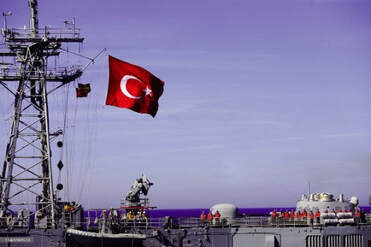Military exercise, Sea Wolf (Denizkurdu) 2019, was held by the Turkish Navy simultaneously in three seas, including the Eastern Mediterranean Sea, the Aegean Sea and the Black Sea.
The exercise, supervised by the Turkish navy, will ran from May 13 through May 25 in the eastern Mediterranean, Aegean and Black Sea with 131 warships, 57 warplanes and 33 helicopters and participation of 25,900 military personnel. During the drill, Turkish Naval Forces carried out strategic and operational exercise with scenarios similar to crisis-tension situations and wartime maneuvers…
Domestic and national weapon systems including high-speed unmanned aerial vehicle (UAV) Şimşek and anti-surface defense boat Albatros also participated in the drills. Five frigates, two corvettes and four storm boats set sail from Gölcük Poyraz Port to participate in the exercise.
Submarines, frigates, naval artilleries, armed UAVs, as well as search and rescue units also participated.
The exercise aims to boost the capability of Turkish Navy’s units and capacity to respond and involved the use of domestically produced weapon systems in tandem with other systems. As in all the other sectors within the defense industry, the Turkish Navy has taken significant steps in recent years to modernize its fleet, increase combat capability and become stronger in the face of growing intimidation and national security threats. The Turkish shipbuilding industry has also made significant progress in the area of military shipbuilding recently, carrying out design and engineering services, as well as exporting sub-industry products.
A day before the military exercise kicked off, Berat Albayrak, Turkey’s finance minister and the son-in-law of Turkish President Recep Tayyip Erdogan, announced on May 12 that his country would soon send a drill ship to exploit natural gas resources in an area widely considered to belong to Cyprus, it was tempting to write off the incident as just another harmless flare-up in the decades-long territorial disputes in the Eastern Mediterranean. Periodically stoking tensions with Greece and Cyprus has always been a part of Turkish foreign-policy strategy.
Turkey has consistently contested the Greek Cypriot administration’s unilateral drilling activity in the Eastern Mediterranean, saying Turkish Cypriots also have rights to the resources in the area. Cyprus has been divided since 1974, when a Greek Cypriot coup followed decades of violence against the island’s Turks and Ankara’s intervention as a guarantor power.
This time is far more dangerous, however, because there are signs Turkey might be ready to escalate its confrontation beyond mere rhetoric. Albayrak’s announcement came a day before Turkey held Sea Wolf, its largest annual naval exercise in the Aegean and Eastern Mediterranean. Then, on May 15, Turkish Foreign Minister Mevlut Cavusoglu reiterated the country’s intention to buy the S-400 missile system from Russia. And throughout this period, Turkish jets have been violating Greek airspace almost daily.
Just before the exercise kicked off the Turkish Foreign Ministry issued a statement in which it claimed that Greece does not respect the demilitarized status of the islands of the eastern Aegean Sea. The statement further called on all NATO warships and vessels currently operating in the region to refrain from using Greek island ports eastern Aegean for visits and refueling.
The drill became the second grand naval exercise of the country in three months. In February, Turkey held “Blue Homeland 2019,” with over 100 vessels on all three seas surrounding the country. The flotilla included 13 frigates, six corvettes, 16 assault boats, seven submarines, seven mine hunting vessels and 14 patrol boats, as well as other navy vessels. The drill was planned six months in advance in line with NATO rules and regulations.
Hurriyet, FP, Greek Reporter

